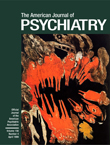Relationship Between Childhood Behavioral Disturbance and Later Schizophrenia in the New York High-Risk Project
Abstract
OBJECTIVE: An association between childhood behavioral disturbance and adulthood schizophrenia has been seen previously in retrospective or follow-back studies and in prospective studies. The authors examined the relationship between childhood behavioral problems and adulthood schizophrenia-related psychoses. Because a high rate of childhood behavioral problems is known to be associated with adult substance abuse, these analyses controlled for substance abuse. METHOD: The subjects of this investigation (N=185) were offspring of parents with schizophrenia or affective disorder and of normal parents from the New York High-Risk Project (sample A). Data on childhood behavioral problems were obtained in a parent interview at initial assessment in 1971–1972. Adulthood outcomes (schizophrenia-related psychoses, affective disorders, anxiety disorders, substance abuse) were based on lifetime axis I diagnoses according to the Research Diagnostic Criteria. RESULTS: Substance abuse had a significant interaction with the clinical outcome groups. In subjects without substance abuse, those with schizophrenia-related psychoses had exhibited significantly more behavioral problems as children than had adult offspring with affective or anxiety disorder or with substance abuse only or no disorder. CONCLUSIONS: These results support the view that schizophrenia-related psychoses can be followed back to early behavioral disturbances. The confounding effects of substance abuse should be statistically controlled in studies of longitudinal associations between childhood behavioral disturbance and axis I outcomes.



